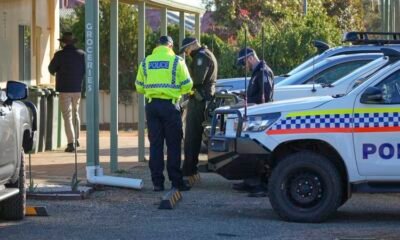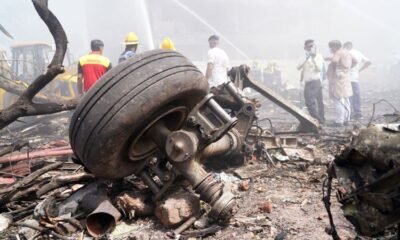Conflict Zones
‘Someone’s listening’: Fear and longing in Syria’s al-Hol detention camp | ISIL/ISIS News

Many of the camp’s detainees had opted to stay home that dusty day, but Asma decided to brave the elements and take advantage of a less crowded marketplace.
With her four children close by her side, she scanned the underwhelming selection of vegetables on display at a small stall, weighing up what dishes she could muster with the limited options on sale.
Asma’s oldest child, a precocious nine-year-old girl with a red-ribboned headband and a pink tracksuit cradled the youngest child, a cherubic one-year-old girl swaddled in a padded jacket.
She adjusted the hood of her sister’s jacket, which had slipped down, causing the toddler to squirm as the dust swirled around her face.
She pulled her little sister towards her chest protectively, drawing a warm nod of approval from her mother.
Asma spends most of her days with her children because she doesn’t feel the education facilities in the camp meet their needs.
As she spoke, her two sons erupted into a spontaneous playfight.
Her expression betrayed a deep melancholy. “It’s difficult to raise children here,” she admitted, her gaze lowered.

The monotony of daily life in the camp, she explained, can often lead to the children fighting and she can find it difficult to control her boys.
On top of that, in her seven years in the camp, Asma has seen prices rise to the point that it is now difficult to buy enough food to feed her growing children.
NGOs distribute daily food rations in al-Hol, but many detainees supplement these ready-made meals and basic ingredients with fresh produce from the market, using money sent by relatives or earned from jobs at the camp’s medical and education facilities operated by NGOs.
Asma’s family has lived through the camp’s most turbulent period, which saw more than 100 homicides from 2020 to 2022 and left a deep psychological impact on the camp’s children, who make up more than half of its population.
In 2021, according to Save the Children, two residents were killed every week, making the camp, per capita, one of the most dangerous places in the world to be a child.
It’s a period that Abed, an Iraqi Turkmen welder from Mosul who preferred to give only one name, kept his four children inside their tent at all times.
When Al Jazeera met 39-year-old Abed, he was working under the shelter of the family repair shop on a side street off the market. The shop, cobbled together from pieces of wood and plastic sheeting, services any machinery that camp detainees need fixed.
He guided his adult son, who is in his early 20s, methodically through a complex welding process, the two smiling at each other as they shared a private joke and the howling wind carried their words out of earshot.

Abed picked up a welding torch as his son held a piece of metal in place with a pair of tongs.
He has taught his children his trade, but that, he said, is just so they can “survive day-to-day”, adding that it will not give them the tools to enjoy a full and fulfilling life.
“My children’s future is gone,” Abed said with a hint of bitterness in his voice. “They’ve missed too much school.”
Several aid organisations run education facilities, but suspected ISIL agents have been known to attack them, so Abed feels it is safer to keep his children away until they can go home.
“We had a good life in Mosul. My children went to school, and everything was fine, but now,” he took a deep breath, “too much time has passed.”
“That’s hard to swallow as a parent because school is everything”.
Conflict Zones
US-backed GHF suspends Gaza aid for full day, names new evangelical leader | Israel-Palestine conflict News

Israeli military warns access roads to the Gaza Humanitarian Foundation’s (GHF) aid distribution sites are now considered ‘combat zones’.
The United States- and Israeli-backed Gaza Humanitarian Foundation (GHF) will suspend aid distribution in the war-torn territory on Wednesday, a day after Israeli forces again opened fire on Palestinian aid seekers near a GHF distribution site, killing at least 27 and injuring more than 100.
Israel’s military also said that approach roads to the aid distribution centres will be “considered combat zones” on Wednesday, and warned that people in Gaza should heed the GHF announcement to stay away.
“We confirm that travel is prohibited tomorrow on roads leading to the distribution centers … and entry to the distribution centers is strictly forbidden,” an Israeli military spokesperson said.
In a post on social media, GHF said the temporary suspension was necessary to allow for “renovation, reorganisation and efficiency improvement work”.
“Due to the ongoing updates, entry to the distribution centre areas is slowly prohibited! Please do not go to the site and follow general instructions. Operations will resume on Thursday. Please continue to follow updates,” the group said.
The temporary suspension of aid comes as more than 100 Palestinian people seeking aid have been reported killed by Israeli forces in the vicinity of GHF distribution centres since the organisation started operating in the enclave on May 27.
The killing of people desperately seeking food supplies has triggered mounting international outrage with United Nations Secretary-General Antonio Guterres demanding an independent inquiry into the deaths and for “perpetrators to be held accountable”.
“It is unacceptable that Palestinians are risking their lives for food,” Guterres said.
The Israeli military has admitted it shot at aid seekers on Tuesday, but claimed that they opened fire when “suspects” deviated from a stipulated route as a crowd of Palestinians was making its way to the GHF distribution site in Gaza.
Israel’s military said it is looking into the incident and the reports of casualties.
On Tuesday, GHF named its new executive chairman as US evangelical Christian leader Reverend Dr Johnnie Moore.
Moore, who was an evangelical adviser to the White House during the first term of United States President Donald Trump, said in a statement that GHF was “demonstrating that it is possible to move vast quantities of food to people who need it most — safely, efficiently, and effectively”.
The UN and aid agencies have refused to work with the GHF, accusing the group of lacking neutrality and of being part of Israel’s militarisation of aid in Gaza. Israel has also been accused of “weaponising” hunger in Gaza, which has been brought about by a months-long Israeli blockade on food, medicine, water and other basic essentials entering the war-torn territory.
Moore’s appointment is likely to add to concerns regarding GHF’s operations in Gaza, given his support for the controversial proposal Trump floated in February for the US to take over Gaza, remove the Palestinian population, and focus on real estate development in the territory.
After Trump proposed the idea, Moore posted video of Trump’s remarks on X and wrote: “The USA will take full responsibility for future of Gaza, giving everyone hope & a future.”
Responding on social media to UN chief Guterres’s outrage following the killing of aid seekers in Gaza on Sunday, Moore said: “Mr Secretary-General, it was a lie… spread by terrorists & you’re still spreading it.
The GHF’s founding executive director, former US marine Jake Wood, resigned from his position before the Gaza operation began, questioning the organisation’s “impartiality” and “independence”.
Critics have accused GHF, which has not revealed where its funds come from, of facilitating the Israeli military’s goal of depopulating northern Gaza as it has concentrated aid distribution in the southern part of the territory, forcing thousands of desperate people to make the perilous journey to its locations to receive assistance.
Conflict Zones
Five UN food aid workers killed in Sudan ambush as hunger crisis deepens | Sudan war News

Deadly attack on United Nations convoy in Sudan disrupts aid to hunger-stricken families in the war-torn country.
An ambush on a United Nations food aid convoy in Sudan has killed at least five people, blocking urgently needed supplies from reaching civilians facing starvation in the war-torn Darfur city of el-Fasher.
Aid agencies confirmed on Tuesday that the 15-truck convoy was transporting critical humanitarian supplies from Port Sudan to North Darfur when it was attacked overnight.
“Five members of the convoy were killed and several more people were injured. Multiple trucks were burned, and critical humanitarian supplies were damaged,” the UN Children’s Fund (UNICEF) and the World Food Programme (WFP) said in a joint statement.
The agencies did not identify the perpetrators and called for an urgent investigation, describing the incident as a violation of international humanitarian law. The route had been shared in advance with both warring parties.
The convoy was nearing al-Koma, a town under the control of the paramilitary Rapid Support Forces (RSF), when it came under fire. The area had witnessed a drone attack earlier in the week that killed civilians, according to local activists.
Fighting between the RSF and the Sudanese army has raged for over two years, displacing millions and plunging more than half of Sudan’s population into acute hunger. El-Fasher, the capital of North Darfur, remains one of the most vulnerable regions.
“Hundreds of thousands of people in el-Fasher are at high risk of malnutrition and starvation,” the UN statement warned.
Both sides blamed each other for the attack. The RSF accused the army of launching an air attack on the convoy, while the army claimed RSF fighters torched the trucks. Neither account could be independently verified.
The attack is the latest in a string of assaults on humanitarian operations.
In recent weeks, RSF shelling targeted WFP facilities in el-Fasher, and an attack on El Obeid Hospital in North Kordofan killed several medical staff. Aid delivery has become increasingly perilous as access routes are blocked or come under fire.
Conflict Zones
Two suspected Ugandan rebels killed in Kampala explosion | Conflict News

A female suicide bomber and another suspected rebel were killed in a blast in Uganda’s capital city.
Two suspected Allied Democratic Forces (ADF) rebels, including a female suicide bomber, were killed in an explosion near a prominent Catholic shrine in Uganda’s capital, Kampala, as crowds gathered to mark Martyrs’ Day.
The blast on Tuesday took place in the upscale suburb of Munyonyo, outside the Munyonyo Martyrs’ Shrine, where Ugandans were assembling to commemorate 19th-century Christians executed for their faith. No civilian injuries were reported.
“A counterterrorism unit this morning intercepted and neutralised two armed terrorists in Munyonyo,” said army spokesman Chris Magezi on X. He confirmed one of the assailants was a female suicide bomber “laden with powerful explosives”.
Footage broadcast by NBS Television, an independent outlet, showed a destroyed motorbike and debris scattered across the road. Police Chief Abas Byakagaba told NBS the explosion occurred while “two people were on a motorcycle,” adding: “The good thing, though, is that there were no people nearby who were injured.”
There has been no immediate claim of responsibility.
While Ugandan authorities are still piecing together the events, Magezi suggested the suspects were linked to the ADF, a rebel group that originated in Uganda in the 1990s but later relocated to eastern Democratic Republic of the Congo.
The ADF has pledged allegiance to ISIL (ISIS) and was behind a spate of deadly bombings in Uganda in 2021.
The group has been accused by the United Nations of widespread atrocities, including the killing of thousands of civilians in the region.
Martyrs’ Day is one of Uganda’s most significant religious holidays, drawing thousands of pilgrims annually. Security forces have increased patrols across the capital in the aftermath of the incident.
-

 Europe5 days ago
Europe5 days agoWhat will happen now that Trump has turned on Putin?
-

 Lifestyle5 days ago
Lifestyle5 days agoPhotos of Cuban women with long decorated nails
-

 Sports5 days ago
Sports5 days agoBill Ackman: Swift backlash after billionaire’s pro debut
-

 Europe4 days ago
Europe4 days agoGerman tourist found alive 12 days after she was lost in the Australian Outback
-

 Lifestyle4 days ago
Lifestyle4 days agoOne Tech Tip: All the ways to unsubscribe, after ‘click-to-cancel’ was blocked
-

 Lifestyle5 days ago
Lifestyle5 days agoCuban women spend on extravagant nail art
-

 Asia4 days ago
Asia4 days agoAir India crash: Engine fuel supply was cut just before Air India jet crash, preliminary report says
-

 Lifestyle5 days ago
Lifestyle5 days agoSebeiba festival in Algeria carries on ancient tradition




